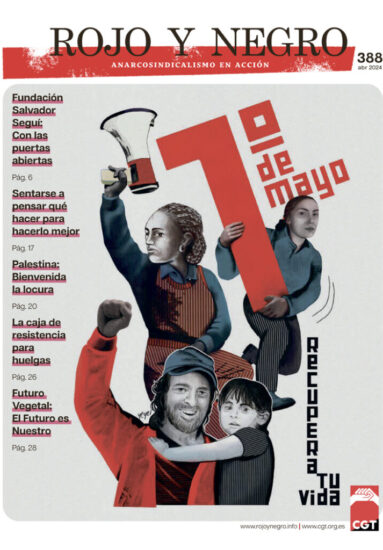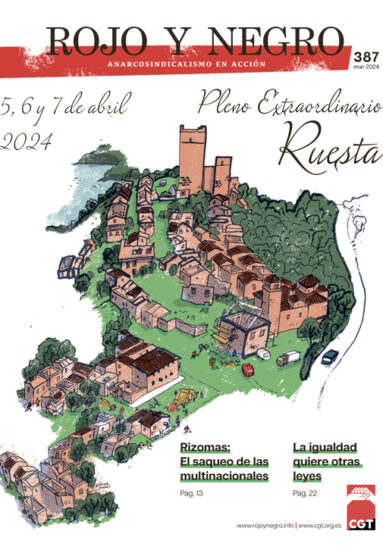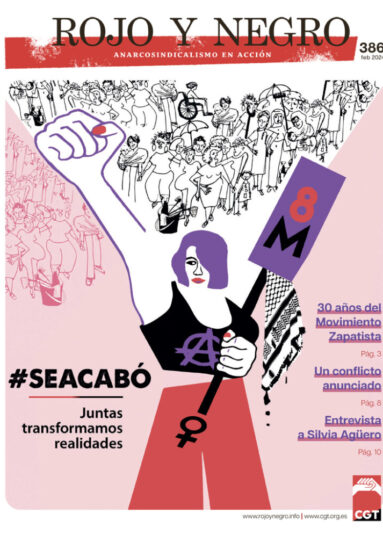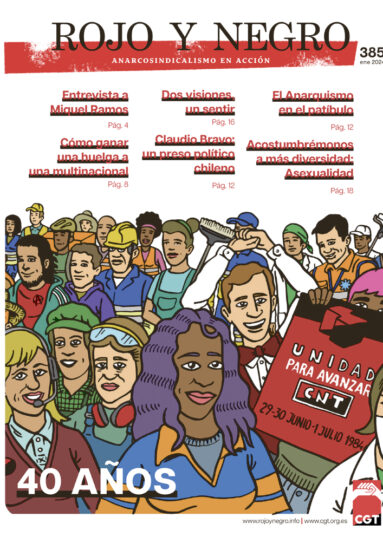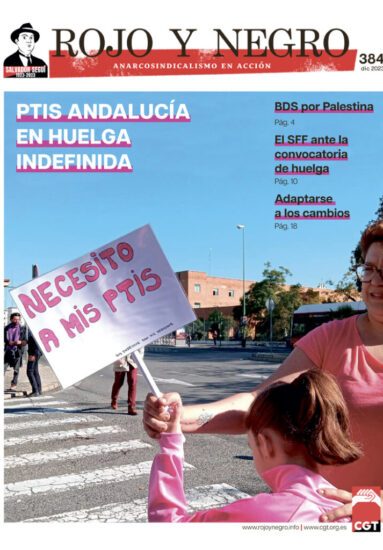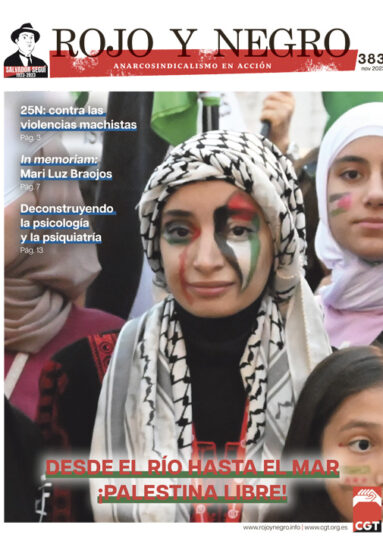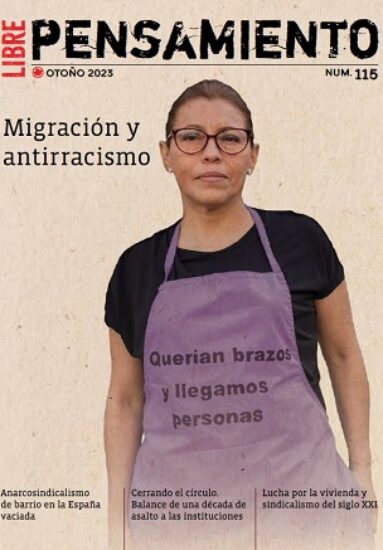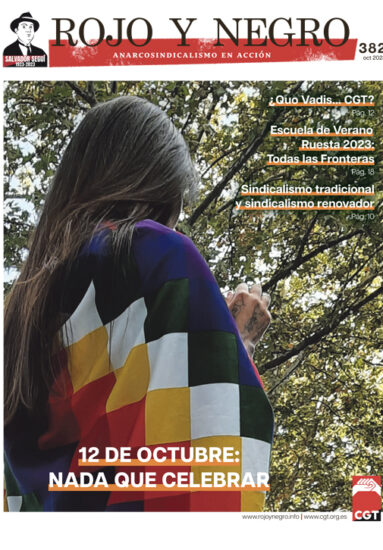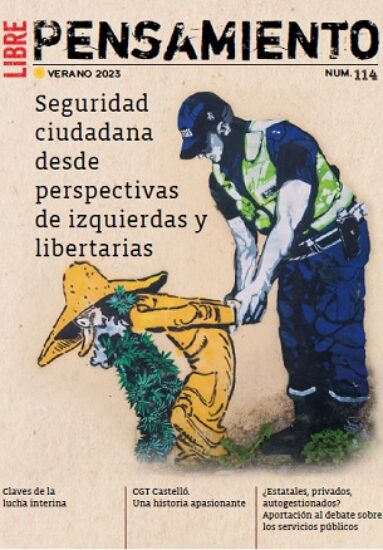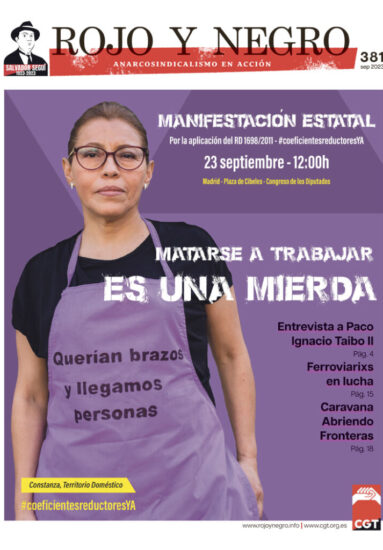en los meses pasados una ola de represión ha golpeado Polonia con fuerza redoblada. La gente que ha sido o esta siendo afectada por esta represión son 80 personas.
También podéis ayudarnos con aportaciones económicas para sufragar gastos de abogados y otros (¿suits ?). Estamos recogiendo el dinero a través de la cuenta de la Cruz Negra Anarquista : PEKAO BP // XX o/Poznań // ul.Stary Rynek 44 // 61-722 Poznań // Poland // swift code : bpkoplpwapoa // for USD : 10204085-5999100-270-44787 // owner : Marek Piekarski
en los meses pasados una ola de represión ha golpeado Polonia con fuerza redoblada. La gente que ha sido o esta siendo afectada por esta represión son 80 personas.
También podéis ayudarnos con aportaciones económicas para sufragar gastos de abogados y otros (¿suits ?). Estamos recogiendo el dinero a través de la cuenta de la Cruz Negra Anarquista : PEKAO BP // XX o/Poznań // ul.Stary Rynek 44 // 61-722 Poznań // Poland // swift code : bpkoplpwapoa // for USD : 10204085-5999100-270-44787 // owner : Marek Piekarski
Amigos,
Por supuesto esto no se ha debido a la victoria de la derecha y los neoliberales en las últimas elecciones presidenciales. Durante varios años las acciones de diversos grupos sociales y políticos se han opuesto a las políticas del gobierno Polaco y han ido sufriendo lmás y más la represión de la policía y la maquinaría del estado. El fenomeno no es accidental sino a gran escala. Durante estos últimos 3 y 4 años activistas anarquistas, trabajadores sociales, izquierda radical, ecologistas y anti militaristas han sido llevados a juicio. La razon de la represión gubernamental es sin duda debida a el aumento de conflictos sociales (por ejemplo el numero de manifestaciones ha aumentado, de acuerdo a los datos de la policía de 315 en 2001 a 2054 en 2003, y 1476 en 2004). El gobierno aparentemente es incapaz de gestionarlo, y por ello reduce las libertades de reunion y de expresión. Pero sabemos que no sólo tenemos derecho a protestar, ¡¡sino que somos ! libres para hacerlo !!.
¡¡Anunciamos para el 8 de noviembre de 2005 un dia de protesta contra la represión estatal y policial !!.
Ese día tendrán lugar manifestaciones por diferentes ciudades de Polonia :(Poznan, Karszawa, Katowize,…). Si podéis hacer algo para protestar y apoyarnos, ¡pues hacedlo !.
Los problemas que encaramos ahora :
1) 31-10-2005 Arresto del dididente político Marek Kurzyniec en Krakow (¿Krakovia ?).
http://pl.indymedia.org/
http://pl.indymedia.org
2) En las últimas dos semanas dos grupos han sido
26.10.2005 – BiaÅ‚ystok-
http://pl.indymedia.org/
31.10.2005 – Warsaw – http://pl.indymedia.org
3) Varias personas se encuentran con cargos por una manifestación contra la guerra en Chechnya, en el aeropuerto de Lawica en Poznan en 2004.
4) De seis a unas pocas docenas han sido encontrados culpables por la manifestación contra la visita de Vladimir Putin a Cracow (¿Cracovia ?) en enero de 2005.
5) Una persona acusada en relación a una masa crítica (protesta en bicicleta) en Poznan.
Friends,
In the past months, a wave of repression has struck Poland with double force. We assess the number of people currently or lately under police repression to be about 80.
Of course it is not only because right-wing and neoliberals have won last parliament and president elections. For several years actions of many different political and social groups that openly protest against the Polish government’s policy are submitted bigger and bigger repressions, with the use of the police and a machinery of court. This phenomenon is not an incidental, but on a mass scale. For the past 3-4 years many activists of anarchist, antiwar, radical left wing, social worker and ecological movement, have been put on trial. The reason of the government’s repressions is undoubtedly an increase in number of social conflicts (for example a number of demonstrations, according to the police statistics, raised from 315 in 2001, to 2054 in 2003, and 1476 in 2004). The government apparently is not able to manage with so tries to restrict the freedom of assembly and speech. But we know that not only we have a r i g h t to protest, but we are f r e e to protest !
We announce 8.11.2005 a day of protest against the state and the police repressions ! That day demonstrations are going to take place in few Polish cities (Poznan, Warszawa, Katowice, Wrocław, Łódź). If you can do anything to protest and to support us- do it !
You can help us by sending a donation for costs of lawyers, suits etc. We are collecting money through the Anarchist Black Cross’s bank account : PEKAO BP // XX o/Poznań // ul.Stary Rynek 44 // 61-722 Poznań // Poland // swift code : bpkoplpwapoa // for USD : 10204085-5999100-270-44787 // owner : Marek Piekarski
The problem we are facing now :
1) 31.10.2005 – arrest of political dissident Marek Kurzyniec in Krakow http://pl.indymedia.org/
2) Last two weeks two squats have been evicted
(26.10.2005 – Białystok- http://pl.indymedia.org/pl/2005/10/16512.shtml#english ;
31.10.2005 – Warsaw – http://pl.indymedia.org/pl/2005/10/16598.shtml )
3) Several people are charged with demonstration against war in Chechnya on Lawica Airport in Poznan in 2004
4) From 6 to few dozen defendants and found guilty in connection with demonstration against Vladimir Putin’s visit in Cracow in January 2005
5) One person accused in connection with a «critical mass» (bicycle demonstration) in Poznan
6) One person convicted of a Nurse and Midwife’s Trade Union demonstration in Warsaw in 2000 (convicted to fine with a possibility to change to arrest) http://pl.indymedia.org/pl/2005/09/15885.shtml#english
7) 11 people are accused with demonstration which took place in Warsaw on 16th of May 2005 (3rd Council of Europe Summit)
8) We don’t precisely know the number of suits against workers protesters. For example 20 people were arrested on the 22nd of October 2002 after the demonstration of shipyard workers. 11 of them were put under accusation. No less than 20 people, maybe even 70 have been charged after the protests in Ozarow on 27-30th of November 2002.
9) Last year gay parades have been banned (11.06.2005 http://pl.indymedia.org/pl/2005/06/14475.shtml )
For more information read detailed report and analysis ! (below or http://rozbrat.org/ulotki/report2.htm )
In solidarity with your struggles,
The Anarchist Federation section Poznan (Federacja Anarchistyczna sekcja Poznan) The Polish Anarchist Black Cross (Anarchistyczny Czarny Krzyz)
P.O.Box 5
60-966 Poznań 31, Poland
fa-poznan@rozbrat.org , ack@rozbrat.org
3.11.2005
Raport 2
In Poland freedom of assembly and speech has been limited. Enough police and state repressions !
The Anarchist Federation and the Polish Anarchist Black Cross in the first report published on 21st of December 2004 have paid attention to the fact that «for several years actions of many different political and social groups that openly protest against the Polish government’s policy are submitted bigger and bigger repressions, with the use of the police and a machinery of court». This phenomenon is not an incidental, but on a mass scale. For the past 3-4 years many activists of anarchist, antiwar, radical left wing, social worker and ecological movement, have been put on trial. It is easy to see not only the rising number of «political» cases, but also passing by courts higher and higher verdicts. Today a number of police, prosecutor’s and legal proceedings is hard to count, however, we can mention these examples :
1) Several people are charged with demonstration against war in Chechnya on Lawica Airport in Poznan in 2004. They are now standing trial in Poznan
2) From 6 to few dozen defendants and found guilty in connection with demonstration against Vladimir Putin’s visit in Cracow in January 2005. They are now standing trial in Cracow
3) One person accused in connection with a «critical mass» (bicycle demonstration) in Poznan is standing trial now in Poznan
4) One person convicted of a Nurse and Midwife’s Trade Union demonstration in Warsaw in 2000 (convicted to fine with a possibility to change to arrest)
5) 11 people are accused with demonstration which took place in Warsaw on 16th of May 2005 (3rd Council of Europe Summit)
We asses the number of people being now or in the last past under police repressions (which include at least detention) at about 80.
We don’t precisely know the number of suits against workers protesters. For example 20 people were arrested on the 22nd of October 2002 after the demonstration of shipyard workers. 11 of them were put under accusation. No less than 20 people, maybe even 70 have been charged after the protests in Ozarow on 27-30th of November 2002.
The reason of the government’s repressions is undoubtedly an increase in number of social conflicts (for example a number of demonstrations, according to the police statistics, raised from 315 in 2001, to 2054 in 2003, and 1476 in 2004), that the government apparently can not manage with. So it try to restrict the freedom of assembly and speech. It has happened at two levels :
Firstly officials have taken actions using formal and legal procedures in order to reduce a freedom of demonstrating. During past few years we could notice many examples of such behavior, we mention here just some of them :
1) The mayor of Poznan gave 11 prohibitions of demonstration to the group Free Caucasus Committee (Komitet Wolny Kaukaz- KWK) who protest against war in Chechnya. Every time when KWK activists demonstrated in spite of illegal prohibition, they were repressed by the police and then the court. On 30th of September 2004 Chief Administrative Court (NSA) considered all prohibitions given by the mayor as illegal. It was announced that he had no right to prohibit anyone from demonstrating. The court referred to 57th article of the Polish constitution which ensures everybody freedom to organize peaceful assemblies and to take part in them. NSA noticed in its verdict that «the constitution introduces the institution of f r e e d o m of assembly, not only the r i g h t to organize them».
2) In the beginning of 2004 the parliament tried to introduce an amendment to the act about assemblies, which would forbid people whose appearance prevents from identification taking part in demonstrations. It would also find an organizer of a protest responsible for damages done by any member of assembly or done shortly after this assembly. Official reason of the planned change of low was safety to the members of protests, but in fact the government wanted to tighten the rights to demonstrate. That amendment was planned to be introduced shortly before protest against he European Economic Forum in Warsaw 2004. The Polish Constitutional Tribunal recognized it as not contrary to the Polish constitution.
3) The local authorities mainly connected with «Prawo and Sprawiedliwosc» (PiS- Right And Justice- the political party that has won last month parliament elections and whose representative has become the Polish president two weeks ago) and «Liga Polskich Rodzin» (LPR -the Polish Families League- the radical right-wing party) have tried to restrict the rights to demonstrate of «Equality Parades» many times in Poznan, Warsaw and Cracow. The most glaring example took place on 11th of June 2005 in Warsaw, where despite the fact that Lech Kaczynski (the present Polish president) banned the parade, about 3 thousand people marched through Warsaw as an act of civil disobedience.
4) The apparatus of the police applies in a mass scale surveillance and intimidation against activists, under a pretence of preventive actions. The well known case of this actions took place at the beginning of 2004 just before the alterglobalist demonstration against the European Economic Forum. The police intruded dozens of activists in their homes and at workplaces, put pressure on them and provoke in order to intimidate and discourage them to participate in the legal protest. On 29th of April 2004 the police abused their power and stopped buses of activists going to protest in Warsaw from Poznan, Elk and other cities. In addition, custom officers didn’t let in two buses of Hungarian activists going to that protest.
Secondly, in many individual and specific cases there are taken actions that restrict freedom of assembly and speech, in which the police and justice administration use the most glaring provocations and low abuses. That includes : using restrictions discouraging to take part in demonstration, brutal police interventions (using violence) during protests in order to provoke protestors and by this creating situations which can be used against them on trial. It is common that the police (often without any evidence) accuses protestors of aggression or assault. Courts usually believe policemen, in the name of the rule that policemen’s testimony is more credible than defendant’s because police officers have no reasons (or business) to lie. Of course the rule of a credibility of a policemen testimony in which Polish courts seem to fully believe has no rational psychological and sociological sense. On the contrary there are many cases when policeman has lain to court, and it is in his business as it is a consequence of intentional strategy of abusing violence by public order services.
It results in :
1) criminalizing people who protest against policy of the authorities
2) police actions are getting more and more violent and sentences of the courts are more and more strict
3) charges are not commensurate with situations, and often concerns completely innocent people
We can mention many examples of those situations, for instance :
1) Proceedings against Andrzej Smosarski has been completed in a court in Warsaw. Andrzej Smosarski has been invited to take part in protest of All-Polands Trade Union of Midwives and Nurses on December 2000 in Warsaw. The demonstration was dispersed by the police force and demonstrators were divided into small groups, surrounded by police cordon. Suddenly, Andrew noticed that one of the women required immediate medical treatment. Despite his requests, police officers refused to let the woman contact ambulances standing nearby. Seeing that, the group of demonstrators, with Andrew among them, started to push forward and finally broke through the cordon of police officers in order to help the sick woman. As a result of that, Andrew and another agitator were accused of assault of a policeman (kicking him in his chest), although nothing like that had happened. In Andrew’s presence, the police officers agreed upon their own false version of the whole accident. Court of first and second instance has found him guilty of violating a policeman’s ,,nietykalność» (immunity). Smosarski was sentenced to 3700 zlotys fine with a commuted to 100 days of imprisonment. With false accusations and a severe sentence, the judges and police obviously want to silence social critique and threaten other activists
2) Agnieszka Wasieczko was one of 11 people arrested after demonstration in Warsaw on 16th of May 2005 against 3rd Council of Europe Summit. They were offended by the police, who even in a police car didn’t want to give a reason and a legal basis for their detention. After arrival to the police station they were kept in a garage belonging to the headquarter. Afterwards they were examined in a tent. Every attempt of resistance was suppressed. Detainees were pulled, pushed, beaten and strangled. One of them was thrown on a table, hit with his head and had his eyelid smashed. All were chained to chairs by their right hand. Policemen took photographs and fingerprints. All irregularities committed by the police during detention were afterwards taken by the court as justifiable. Ironically, Agnieszka Wasieczko were accused that «by kicking and hitting with her hands a policeman face, she violated his corporal inviolability», and «in the same place by shouting : «you are fucked» she wanted to force the policemen to stop the actions», and finally that «she insulted the police officer by using words commonly known as offensive». For this she may be sentenced for 3 years of imprisonment. Agnieszka firmly denies that any of these events had place during the detention.
3) The organizers of planned on 26th of January 2005 demonstration against Vladimir Putin visit in Cracow reported to the Town Council about the protest on 24th of January. The Town Council rejected their application because it was «too late». Despite this, on 26th of January the protest of human rights protestors took place. It started peacefully till several officers shouted : «we’ll take him !» and tried to take one demonstrator who kept the Chechenyan flag. Being surprised with officers’ assault other members of the protest decided to help and to shelter the beaten demonstrator. The reaction of the police was that several people were pulled on the snow, kicked in the legs, had their arms twisted and hair torn out. Taking out one demonstrator the police attacked next person in a similar way. According to the protest participants, outside observers and even the media who wrote a statement about aggressive behavior of the police, the police reaction was no justified. What is more, we can suppose the brutal intervention was intentional in order to change the image of protesting people from peaceful demonstrators to «dangerous hooligans». Demonstrators did not use violence or did not call for violence, just chanted slogans, which didn’t offend anybody. Policemen individually said to the protesters to finish the meeting, but nobody heard a call to disperse announced through a police megaphone or in other official legal way. The police didn’t let protesters to finish the protest and disperse by their own but created a cordon around protest participants and did not inform about anything. Half hour later only individuals after being identified were taken straight to the police cars. People who didn’t have any documents were immediately taken into custody. Whole action finished at 7, when the last frozen and drenched person was released. Over 30 protesters were detained. The police officers refused detainees the possibility of writing a complaint about conditions of detention, as well as they didn’t give reasons of detention and didn’t pass copies of the proceedings. In the meantime few new policemen were substituted at the police station, who officially entered into proceedings as these who collared (although they weren’t). At least two detainees weren’t allow to see the doctor. The police took pictures of all detainees without the previous permission and accusation, which is unlawful. Person who opposed was dragged to the place where photographs were taken by force. Not everybody received a warm meal during all day, but just a cup of tea, although they were wet and frozen from dragging through puddles and snow during the intervention. Those who wanted a vegetarian meal get only several slices of bread. Two hours after being released from the police station one detainee fainted few times. She was immediately taken to the hospital, where doctors recognized exhaustion of the body caused by starvation and stress. At the beginning the police accused 33 people, but finally they decided to send for a trial the cases of 6 people : Iwona Bojarczuk, accused of pushing away hands and pulling at an officer ; Jan Sawicz, accused of pushing away an officer’s hands ; Marek Kurzyniec, accused of waving hands and pulling with an officer ; Monika Gilowska, accused of waving her hands in front of an officer ; Grzegorz Sobieszka, accused of waving his hands and legs, making the detention difficult by kicking into police car’s doors, kicking an officer in a head and insulting an officer by using vulgar words ; Karolina Wiśniewska, accused of having illegal drags. Claims of human rights abuses against the prisoners include : throwing people into water despite the sub-freezing temperatures ; kicking people in the genitals, pulling their hair (dreadlocks) in order to exert pain, throwing two women to the ground and putting their knees on the women’s backs despite no violence from the side of the protestors.
4) On 26th of November 2004 cyclists organized a «critical mass»- bicycle protest in Poznan. From the very beginning appeared several police cars and officers subjected the cyclists to a routine control. The police made a list of cyclists, who decided to continue their protest. No policeman informed demonstrators in any way that that demonstration was illegal. Near to the Freedom Square the police cars freely overtook cyclists but then they blocked the road. Policemen bluntly threw people off from their bicycles, threw the detained on bonnets of the police cars and on a fence. They were offended, pulled, kicked, persecuted and demeaned. Undoubtedly provocation was a part of an intervention scenario. A senior officer threatened the detained not only verbally, and young policemen followed his example. They used words : «paws on fence fucker and legs wide spread, other way I’ll kick your ass». Every objection or movement of the detainees ended with threat of accusation about making difficulties to the actions of police. In a short time tens of people were standing along fence with wide spread legs and hands on a fence. Policemen did not react when protester invoked the law e.g. the act about the police. In such circumstances none of cyclists accepted fines and all became arrested. Persecutions and humiliations were repeated at the police station. Few hours later almost all demonstrators were free but they would face the trial at local court. But Sławomir Kmiotek become detained on a charge of punishable threat, only because he rebuked the police officers during the intervention that they had used means inadequate to the situation. At the police headquarter in accuser’s presence policemen established their testimonies. Sławomir Kmiotek may be sentenced for 3 years of imprisonment
In all these cases the fact that intervening public order services do not respect freedom of assembly and speech has a fundamental meaning. The public opinion is rarely informed about repressive methods of the police actions. The media sometimes bow before the illusion of «the state of law» and they believe the police and prosecutor’s excuses. Meanwhile, year by year we become more and more closer to the authoritarian system, where democratic standards are established by the police officers and the officials of the state administration. Under a pretence of crime and terrorism menace they try to force legal solutions, which will be ruthlessly used against the political antisystemic opposition.
The Anarchist Federation section Poznan (Federacja Anarchistyczna sekcja Poznan) The Anarchist Black Cross (Anarchistyczny Czarny Krzyz) 23.10.2005
Par : rr.ii.
Fuente: CGT Internacional


